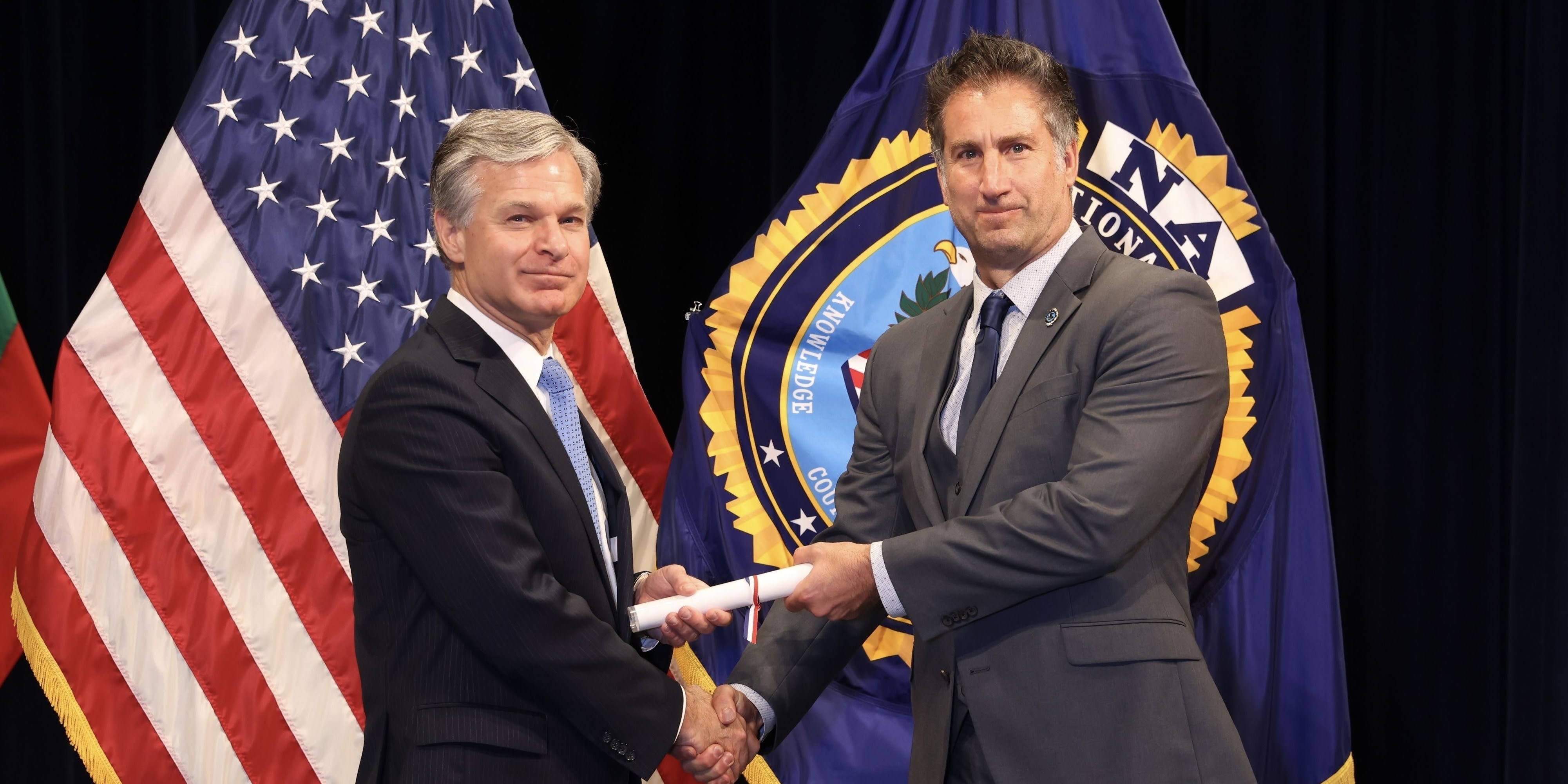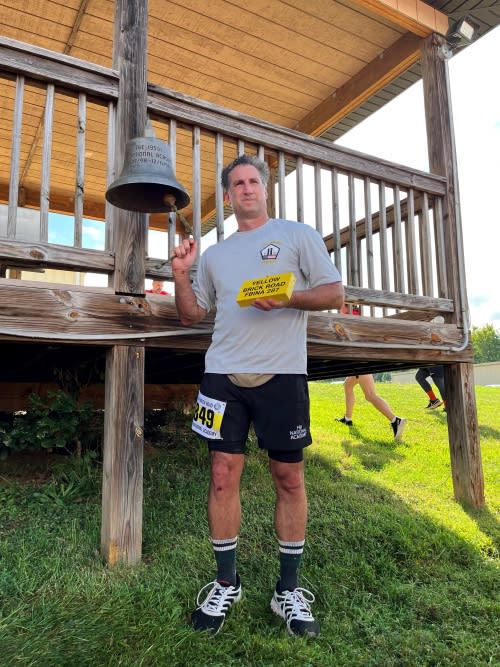
‘You’re learning from the premier law enforcement organization’
The ground was wet from the prior weekend’s storm when Steve Martingano grabbed for the rope at the top of the obstacle, the third in the first mile of the course tucked deep in the Virginia foothills. Not realizing his grip would take the slack from the rope, he slipped halfway down, hitting both his knees.
Martingano still had five miles to go.
Navigating the U.S. Marine-built course is a privilege extended to few people in the world – it constitutes the final test of the fitness challenge that is part of the FBI National Academy in Quantico, Virginia. Fewer than 1% of police officers in the United States are invited to take part in the 10-week program, which offers advanced leadership, communication and fitness training. Successfully traversing the grueling course, known as the Yellow Brick Road, affirms completion of an experience respected worldwide. The RTD deputy chief considered all of this as he rang a bell at the finish and was handed a commemorative yellow brick.
“The whole entire program is exhausting – mentally, physically, emotionally,” Martingano said. “Just having it (the brick) is an accomplishment.”
Martingano – who began his law enforcement career 30 years ago, with the New York City Police Department – is the first member of the RTD Transit Police Department to complete the National Academy. He graduated Sept. 14 as a member of the 287th session, a class that included 199 law enforcement officers from 46 states and Washington, D.C. Agencies spanned 21 countries, four military organizations and three federal civilian organizations. Martingano was one of four participating individuals from Colorado.
“It’s such a small group, but it’s so far-reaching,” Martingano said, referencing the small number of people accepted into the National Academy and the worldwide influence that it holds. To have completed the program, he added, is a huge accomplishment: “It’s the FBI at the end of the day. You’re learning from the premier law enforcement organization.”
Martingano’s interest in the National Academy was piqued after he participated in a regional Command College offered by the FBI in Golden. Former colleagues with the Arvada and Denver police departments, where Martingano worked before joining RTD, had taken part in the National Academy and told him the experience was first-rate. Participants typically return to their agencies to serve in executive-level positions.
RTD maintains an excellent working relationship with the FBI, Martingano noted, and both entities work together on issues of mutual interest. After petitioning for more than four years, Martingano was told he would be a good fit for the National Academy, to which officers bring an average of 21 years of law enforcement experience. He was asked this spring whether he had interest in joining a class in July.
“It was a huge time commitment,” Martingano said. “I can’t thank the chief, the command staff and (General Manager and CEO) Debra (A. Johnson) enough for allowing me to go. My colleagues stepped up and took over a lot of my duties. My family gave up their summer. They knew this was something I wanted to do.”
Most participants rank from lieutenants to chiefs at their home agencies, Martingano pointed out, but at Quantico, “you are the same as everybody else. Titles mean something within decision-making, but that title doesn’t entitle you to anything different. People are people. In class, they were just their names.”
Egos had to be checked at the door: Classmates were placed two to a dorm, four to a bathroom. A uniform was required. Days began at 7:30 a.m. Individuals ate meals in a cafeteria part of the FBI Training Academy, the same facility where the FBI trains its new special agents and intelligence analysts. Tours were often underway, with dignitaries from other countries visiting the complex.
The buildings themselves are hallowed ground, and the experience of walking the hallways is hard to put into words, Martingano said. “It’s been there forever. The people who have gone through there, the library and all the books, you think, who has thumbed through these pages?”
The classes featured excellent instructors who explored areas of high interest to the group, including community policing, organizational management and leadership, and public speaking. One course delved into ChatGPT, drones and robotics.
Beyond classroom lessons, Martingano said, the best part of the experience was the students – the observations and perspectives they brought, and the lessons and ideas everyone shared. Agencies from other countries approach policing differently, he observed.
And unlike a traditional police academy – where officers are often scared to raise their hand – the FBI’s instructors recognize the experience brought by those in the room.
“They know that if someone in class is going to speak, they are probably going to share something with the group that’s relevant,” Martingano said. “Here, you’re in a group of your peers. You’re going to learn something from somebody. And you realize you can offer a lot.”
Classmates spoke openly about recruitment and retention issues, for example, and shared what they were doing to combat them. Some conversations explored community policing and youth involvement, which led Martingano to consider what the Transit Police Department can do to build relationships with young people, now that the Zero Fare for Youth program is in place. “We are going to be the first people they see when they are taking the bus or the train,” he observed.
Dr. Joel Fitzgerald Sr., RTD’s Chief of Police and Emergency Management, has completed the FBI National Executive Institute, an exclusive program for major city chiefs and assistant chiefs. “The FBI National Academy is a once-in-a-lifetime experience that challenges participants to become better versions of themselves, both as law enforcement professionals and as people,” he said. “As Deputy Chief Martingano returns to work after this focused time away, he will bring observations and perspectives that benefit our growing department and provide strategic focus to the work we do.”
Martingano noted that the National Academy builds important collaboration between the FBI and police divisions and departments – each type of law enforcement needs the other. And whether his classmates came from a large department like the one where he started his career – or another with just three officers – everyone graduated with the same curriculum.
“At the end of the day, we all have the same job,“ he said. “And if you don’t learn from each other, you’re never going to grow.”
